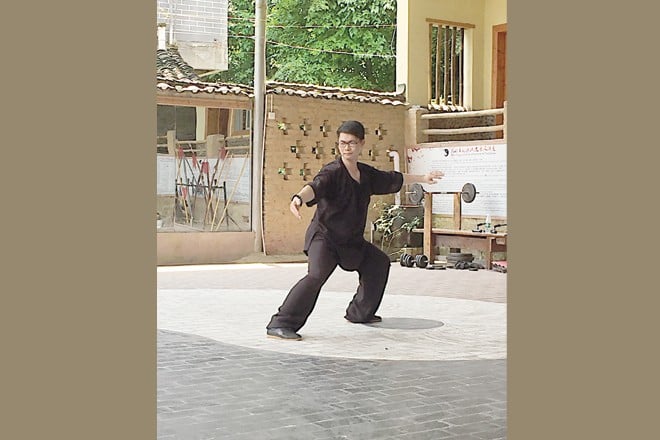
The ancient Chinese art of Tai Chi, practiced at the Yangshuo Traditional Tai Chi School, lent a sense of equilibrium that is difficult to find in the turbulent times we live in

I had earmarked Tai Chi lessons as the most important part of a family vacation to Gulin, which is in the Guangxi Province of China. While Guilin itself is on the World Protection List for natural landscapes and was an experience in itself, it was the need to understand and to some degree sustain the balance that Tai Chi promises that excited me. We live in turbulent times; unpredictable days roll through our lives and vice versa. To maintain a mind-body-soul equilibrium, assuming that was what Tai Chi imparts, is what I was looking for.
Not knowing what to expect, we traveled higher up into the Yangshuo hills one cloudy morning. Rice paddy fields cradled the narrow road, further embraced by Guilin’s iconic mountains that rose like sacred mounds all over the region. It was lush green as far as the eye could see; the greenness broken only by the bright blue sky that promised sunshine even as the clouds let down a soft drizzle. This was the balance of nature, splendid and breath taking.
Eventually we arrived at the Yangshuo Traditional Tai Chi School, an ancient institute that doubled as a hostel for foreigners who wished to spend time here. It’s difficult to think of peace when you’re living the nightmare known as ‘life’ day and night but there was unbelievable serenity to the place, a silence broken only by the talking mynah birds that cooed us a welcome "nee hao" in Chinese. Or the sound of water that flowed around the school, water that was speckled with colourful carp. Tai Chi is commonly translated to ‘meditation in motion’ and just being there was lesson one in how man and nature had the power to coexist in perfect harmony.
Our limited exposure to martial arts or Tai Chi was Kung Fu Panda (I’m ashamed to admit) and we had joked about it, hoping that our instructor would be someone like Master Shifu. Master Wu YuPing, however, was a lot younger and surprisingly bespectacled, which made him look like a reader more than a martial arts expert. But the award winning practitioner had 20 years of Tai Chi on him and exercises that we had assumed would be a piece of cake (we had pompously felt Tai Chi was ‘old peoples’ exercise) turned out to be quite challenging. Our minds, thoughts and bodies are so rigidly set in routine, even the routine of the kind physical exercise we get in our day-to-day schedules, that balancing energies through movement was extremely tricky. But once he managed to set us in motion it felt as if we were balancing energies as harmoniously as a symphony balances musical notes.
There were seven of us, standing in the school verandah, with an enormous yin-yang symbol painted on the floor. The Chinese characters for Tai Chi Chuan can be translated as the ‘Supreme Ultimate Force’ and the notion of ‘supreme ultimate’ is often associated with the Chinese concept of yin-yang, the notion that one can see a dynamic duality (male/female, active/passive, dark/light, forceful/yielding, etc.) in all things. It’s that force that one sets out to achieve in Tai Chi.The exercises included stretches and fluid, circular movements that appeared to be balancing unseen forces in the atmosphere. Almost dance-like to look at, the exercises were done without sound or music and yet everyone moved in perfect synchrony. It was elegant and quite amazing. After our third set of exercises, when we thought we had finished, we all stepped back and started wearing our shoes or collapsing over water bottles when a calm Master Ping called us back.
"You cannot end a session so abruptly," he smiled. "You must honour tradition and we must end the session together, paying respect to each other." The final salutation was the right hand clenched in a fist and resting it against the left, open palm to form a perfect triangle. The thumb must always be tucked in the fist, Master Ping explained, or else it appears you’re saying ‘I am better than you’. Humility is a huge lesson taught in Tai Chi.
We were in Guilin for several days and of course, it was hardly enough to learn let alone master the skill, but for people looking for inner peace or the power to find and maintain inner calm (that would be all of us wired and over worked hyperchondriacs), Tai Chi is highly recommended. Now, where does one find a Master of the art in Karachi?